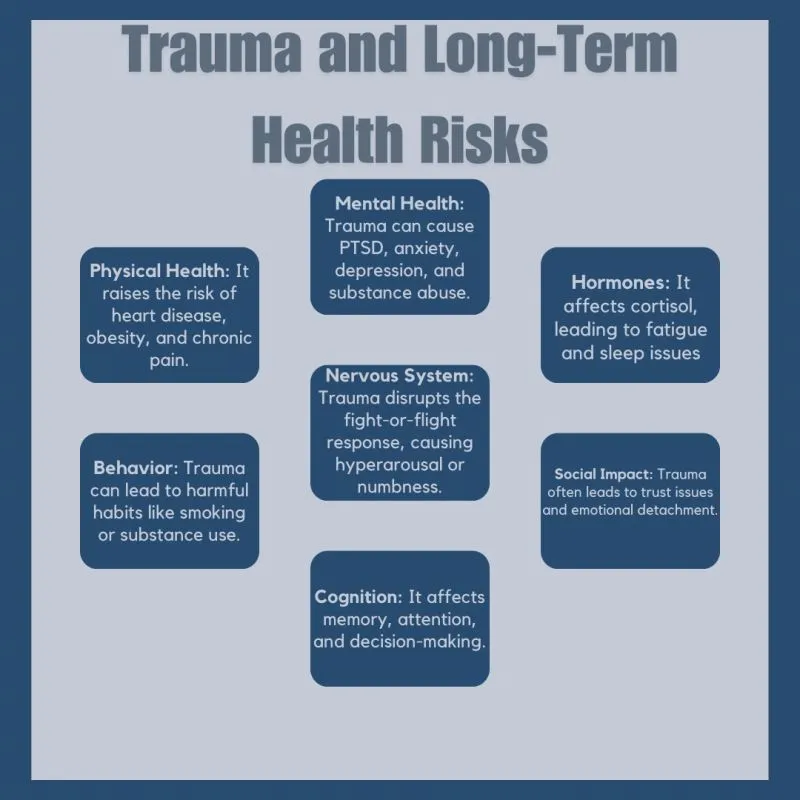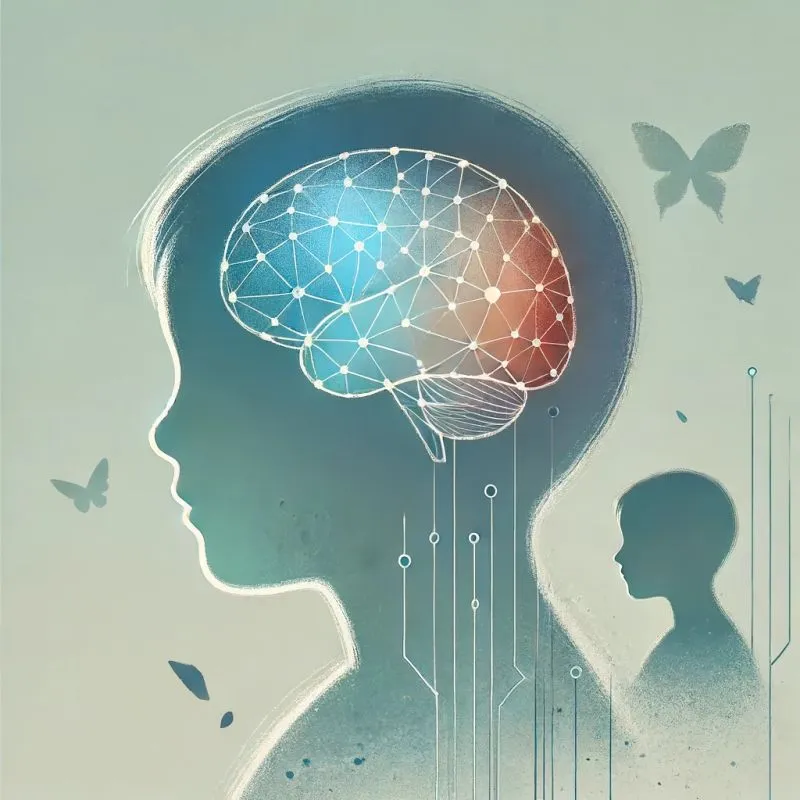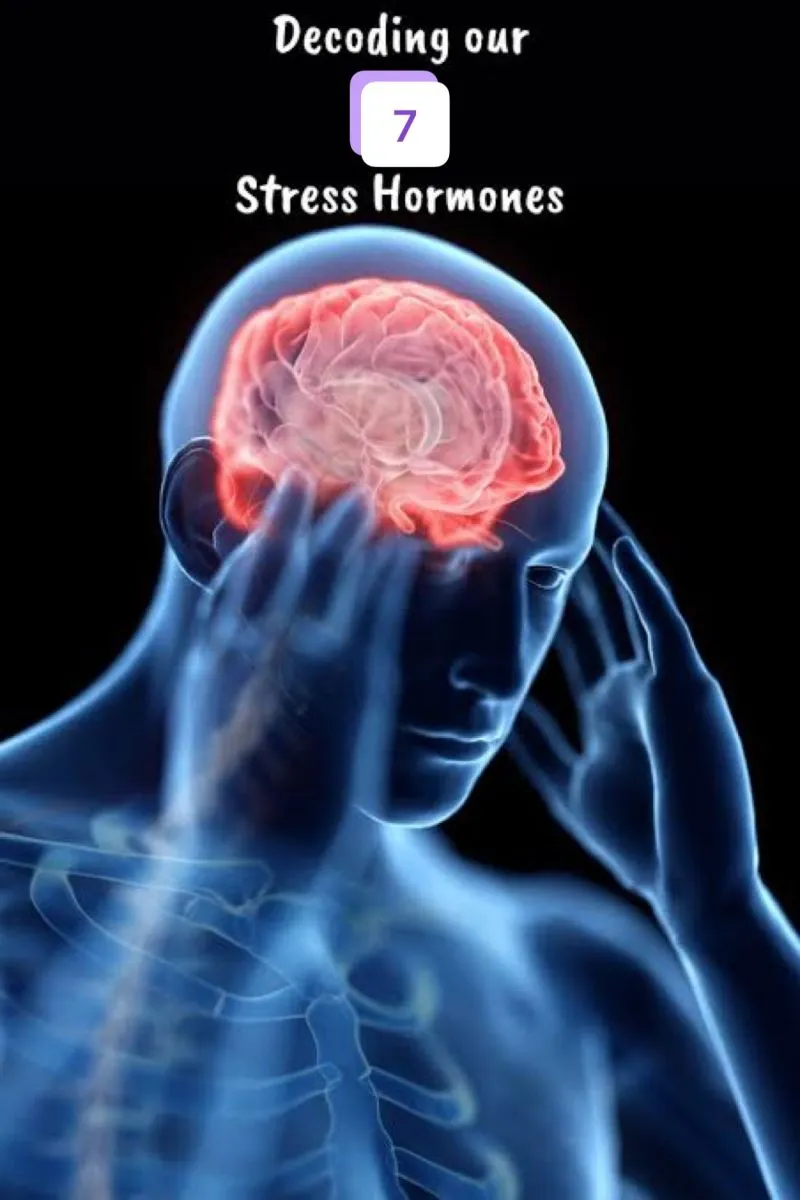Research shows that 64% of adults experienced at least one adverse childhood experience, with those having 4+ ACEs facing 12 times higher risk of depression and suicide attempts. Trauma doesn't just affect your mind—it reshapes your body's stress response, immune system, and physical health for decades.
Why Your Body Remembers What Your Mind Wants to Forget
Years after a traumatic experience ends, you might find yourself dealing with unexplained health issues: chronic headaches, digestive problems, autoimmune conditions, or persistent fatigue that doctors can't quite explain. Perhaps you notice your heart racing in situations that shouldn't be threatening, or you feel constantly on edge without knowing why. These aren't signs of weakness or imagination—they're your body's way of carrying the imprint of past trauma. Research from the landmark CDC-Kaiser Adverse Childhood Experiences (ACEs) study reveals that 64% of adults experienced at least one traumatic event before age 18, and these experiences fundamentally alter how our bodies and minds function for decades to come. At LissnUp, we understand that trauma isn't just a psychological experience—it's a whole-body event that can affect your health, relationships, and daily functioning long after the initial trauma has ended.
How Trauma Rewires Your Brain and Body
Your Stress Response Gets Stuck 'On'
Trauma fundamentally alters your autonomic nervous system—the part of your body that controls your fight, flight, or freeze responses. Instead of activating only during actual danger, this system can become hypervigilant, treating everyday situations as potential threats. This means your body is constantly flooded with stress hormones like cortisol and adrenaline, leading to chronic inflammation, weakened immune function, and exhaustion that doesn't improve with rest.
Brain Development and Function Changes
Trauma, especially in childhood, affects how the brain develops and functions. The amygdala (fear center) becomes overactive while the prefrontal cortex (responsible for rational thinking and emotional regulation) may be underdeveloped. This can result in difficulty concentrating, memory problems, trouble with decision-making, and challenges regulating emotions—symptoms that can persist well into adulthood.
The Body Keeps Score in Every System
Chronic trauma exposure affects nearly every system in your body. Your immune system becomes dysregulated, making you more susceptible to infections and autoimmune conditions. Your cardiovascular system bears the burden of constant stress, increasing risk of heart disease and high blood pressure. Even your digestive system is affected, as the gut-brain connection means trauma can manifest as chronic stomach issues, IBS, or other gastrointestinal problems.
The Physical Price: When Trauma Shows Up in Your Body
Chronic Health Conditions Linked to Trauma
Adults with four or more ACEs are significantly more likely to develop chronic diseases including heart disease (2.2 times higher risk), diabetes (1.6 times higher risk), and cancer. They're also more prone to autoimmune conditions, chronic pain syndromes, and respiratory problems. These aren't just correlations—trauma literally changes how your cells function and your body's ability to heal and maintain itself.
Sleep and Energy Disruption
Trauma often results in chronic sleep disturbances that go far beyond occasional insomnia. Your hypervigilant nervous system may make it difficult to feel safe enough to enter deep, restorative sleep. Even when you do sleep, you might not feel rested because your body remains partially alert for danger. This chronic sleep disruption compounds other health problems and makes emotional regulation even more challenging.
Hormonal and Metabolic Changes
Prolonged exposure to stress hormones disrupts your entire endocrine system. Cortisol dysregulation can lead to weight gain (particularly around the midsection), blood sugar instability, thyroid problems, and reproductive hormone imbalances. Your body essentially gets stuck in survival mode, prioritizing immediate survival over long-term health and healing.
The Emotional and Social Aftermath
Mental Health Conditions That May Develop
Research shows that people with higher ACE scores have dramatically increased risks of developing depression (4.5 times higher), anxiety disorders, PTSD, and substance abuse issues. The risk of suicide attempts increases by 12 times for those with four or more ACEs. These aren't personal failures—they're predictable responses to overwhelming experiences that exceeded your capacity to cope at the time.
Trust and Relationship Challenges
Trauma often affects your ability to form and maintain healthy relationships. You might struggle with trusting others, fear abandonment or intimacy, or find yourself repeatedly drawn to unhealthy relationship patterns. These challenges aren't character flaws—they're protective mechanisms your mind developed to keep you safe, even when those same mechanisms now interfere with connection and happiness.
Emotional Regulation Difficulties
Many trauma survivors experience intense emotions that feel overwhelming or, conversely, emotional numbness that makes it hard to connect with feelings at all. You might have difficulty identifying what you're feeling, expressing emotions appropriately, or managing intense emotional responses to everyday situations. This isn't about lacking emotional intelligence—trauma affects the brain areas responsible for these skills.
The Path Forward: Healing Is Possible
Your Brain Can Heal and Rewire
The same neuroplasticity that allowed trauma to change your brain also allows healing. With appropriate support and treatment, you can develop new neural pathways, improve emotional regulation, and reduce the hypervigilance that keeps your body in chronic stress. Trauma-informed therapies like EMDR, somatic experiencing, and trauma-focused CBT have strong research support for helping people heal.
Building Safety and Support
Healing happens in the context of safety and supportive relationships. This might mean working with a trauma-informed therapist, building connections with understanding friends or family, or finding community with others who have similar experiences.
Sometimes having someone who can truly listen without judgment provides the emotional safety needed for healing to begin.
Holistic Approaches to Healing
Because trauma affects your entire being, healing often requires addressing both mind and body. This might include practices like yoga, meditation, or other body-based therapies that help regulate your nervous system. Regular exercise, good nutrition, and adequate sleep support your body's natural healing processes.
Understanding how your specific trauma history affects you can guide you toward the most helpful healing approaches.
You Are Not Defined by What Happened to You
Understanding how trauma affects your body and mind years later isn't about dwelling in the past or using trauma as an excuse—it's about having compassion for yourself and making sense of symptoms or patterns that may have puzzled you for years. When you understand that your chronic health issues, relationship challenges, or emotional struggles may be connected to past trauma, you can stop blaming yourself and start focusing on healing. Your trauma responses were adaptive strategies that helped you survive difficult circumstances. The fact that you're here today is a testament to your resilience and strength. While trauma may have shaped you, it doesn't define your worth or determine your future. With understanding, support, and appropriate care, you can heal from trauma's effects and create the healthy, fulfilling life you deserve. Every step you take toward healing honors both your past survival and your future potential.





